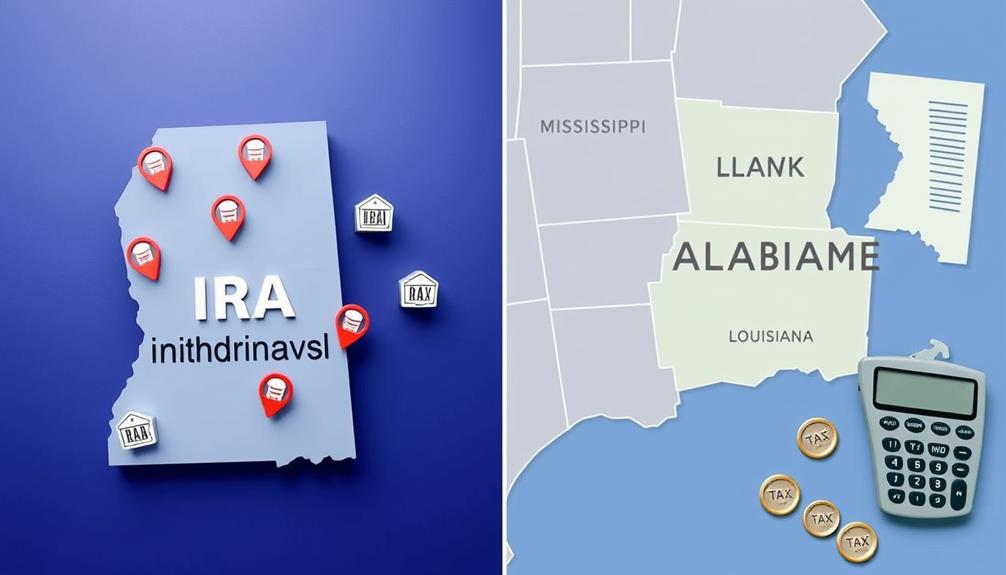In Mississippi, you do not have to worry about paying state income tax on your IRA withdrawals, making it a favorable state for retirees. This tax exemption gives you more freedom in handling your retirement funds. While traditional IRA withdrawals are subject to federal taxes at regular rates, Roth IRA distributions can be tax-free under specific circumstances. It is important to carefully manage your withdrawals alongside other sources of income to maximize your overall tax situation. Knowing these details can improve your financial stability. Stay tuned to learn more about the additional tax advantages that Mississippi provides for your retirement planning.
Key Takeaways
- Mississippi exempts IRA withdrawals from state income tax, enhancing retirees' financial flexibility.
- Traditional IRA withdrawals are subject to federal income tax, while Roth IRA withdrawals may be tax-free under certain conditions.
- Early withdrawals from traditional IRAs incur a 10% federal penalty unless exceptions apply, affecting financial planning.
- Mississippi has no inheritance or estate taxes, simplifying wealth transfer and estate planning for retirees.
- Federal tax implications on IRA withdrawals are crucial for effective retirement income management and minimizing overall tax burden.
Overview of Mississippi Tax Policies

When it comes to retirement planning, understanding Mississippi's tax policies can be a game-changer. In this state, you won't have to worry about state taxes on retirement income. That means IRA distributions, pension payouts, and Social Security benefits are all exempt from state taxation, providing you with significant financial relief.
Unlike many other states, Mississippi doesn't consider retirement income taxable, allowing you to keep more of your hard-earned savings.
Moreover, the property taxes in Mississippi are among the lowest in the nation, with a median annual property tax of just $1,052. This low rate can make a huge difference in your overall cost of living during retirement.
Additionally, you won't have to deal with estate or inheritance taxes, which means you can preserve your wealth for your heirs without the worry of losing a portion to taxation.
Tax Treatment of IRA Withdrawals

When it comes to IRA withdrawals in Mississippi, you won't face any state income tax, which can be a huge advantage for your retirement planning.
However, you'll still need to take into account federal tax implications and how to manage your withdrawals wisely.
Understanding these factors can help you maximize your retirement savings effectively.
Mississippi IRA Tax Exemption
Steering retirement finances becomes much easier in Mississippi, thanks to the state's IRA tax exemption. In Mississippi, all forms of retirement income, including IRA withdrawals, are exempt from state taxation. This means you won't have to worry about state taxes eating into your hard-earned funds from traditional IRAs, Roth IRAs, or even 401(k)s.
This exemption simplifies your financial planning, allowing you to focus on enjoying your retirement without the burden of state taxation.
Moreover, Mississippi's overall tax-friendly environment is enhanced by its low property tax rates, making it an attractive option for retirees. You can stretch your retirement income further, as the lack of state tax on IRA withdrawals means more money stays in your pocket.
Additionally, with no estate or inheritance tax in Mississippi, you're better positioned to preserve your wealth for future generations.
Ultimately, the state's generous IRA tax exemptions support your financial goals, ensuring that your retirement planning is as straightforward and beneficial as possible.
Enjoy the peace of mind that comes with these favorable tax conditions, and make the most out of your retirement years in Mississippi.
Federal Tax Considerations
Understanding the federal tax implications of IRA withdrawals is essential for effective retirement planning. Withdrawing from traditional IRAs is subject to federal income tax at your ordinary income tax rate, which can range from 10% to 37%. In contrast, Roth IRA withdrawals are generally tax-free if you're at least 59½ years old and have held the account for five years.
Be mindful of early withdrawals from traditional IRAs, as they can incur a 10% federal tax penalty unless exceptions apply. Additionally, you must begin taking Required Minimum Distributions (RMDs) by April 1 following your 72nd birthday; failing to do so can lead to a hefty 50% penalty on the amount you should've withdrawn. Fortunately, you can roll over funds from one IRA to another without immediate tax consequences if completed within 60 days.
Here's a summary of the key tax considerations:
| IRA Type | Tax Treatment | Penalty for Early Withdrawal |
|---|---|---|
| Traditional IRA | Subject to federal income tax | 10% penalty (unless exceptions apply) |
| Roth IRA | Generally tax-free | Not applicable |
| Required Minimum Distributions | Must start by age 72 | 50% penalty on missed RMDs |
Planning IRA Withdrawals Wisely
Planning your IRA withdrawals wisely can greatly impact your financial well-being in retirement. In Mississippi, you're fortunate that IRA withdrawals are exempt from state taxation, allowing you to access your retirement income without incurring additional state tax liabilities. This lack of state tax on IRA distributions means you can withdraw funds as needed, providing flexibility and peace of mind.
However, it's important to remember that while Mississippi won't tax your withdrawals, they may still be subject to federal income tax. Consequently, you should plan your withdrawals carefully to minimize your overall tax burden and guarantee financial sustainability throughout your retirement years.
Consider balancing your IRA withdrawals with other income sources to maintain a diverse income portfolio. This strategy can help you avoid pushing yourself into a higher federal tax bracket, allowing you to stretch your retirement savings further.
Ultimately, understanding the implications of IRA withdrawals will empower you as a retiree in Mississippi to make informed decisions that support your financial goals. By planning wisely, you can enjoy a comfortable retirement while making the most of your hard-earned savings.
Comparison With Other States

When it comes to state tax implications for IRA withdrawals, Mississippi stands out as an exceptionally tax-friendly option for retirees. Here, IRA withdrawals are completely exempt from state income tax, making it a prime choice for those relying on retirement income. This is a significant advantage compared to states like Alabama, which partially tax retirement distributions for residents aged 65 and older, allowing only the first $6,000 to be tax-exempt.
In a broader comparison with other states, California and New York tax IRA withdrawals as regular income, with rates reaching up to 14.4% and 10.9%, respectively. Such high state taxes can severely impact your financial relief during retirement.
While states like Florida and Texas may not impose any state income taxes, Mississippi's unique absence of tax on retirement accounts provides a considerable benefit.
Additionally, Mississippi doesn't have estate or inheritance taxes, unlike Connecticut, which does impose estate taxes on larger estates.
This overall tax structure enhances Mississippi's appeal, making it a favorable environment for retirees focused on maximizing their financial security and minimizing tax burdens on their retirement income.
Social Security Tax Status

When you consider your retirement income, it's essential to understand how Social Security benefits fit into the tax landscape.
In Mississippi, these benefits are completely exempt from state taxation, allowing you to keep more of your hard-earned money.
This exemption not only supports your financial security but also simplifies your overall tax planning.
State Tax Exemption Benefits
One of the key benefits of retiring in Mississippi is the state's full exemption of Social Security benefits from state taxation. This means you won't have to worry about additional state tax burdens on your Social Security income, offering significant financial relief.
By not taxing these benefits, Mississippi stands out as one of the most tax-friendly states for retirees, making it an attractive option for those seeking a comfortable retirement.
With this state tax exemption benefit, your retirement income can stretch further, allowing you to retain more of what you've earned. You can plan your finances with greater ease, knowing that your Social Security benefits won't be classified as taxable income.
This exemption simplifies tax planning and enhances your overall retirement experience.
In addition to the financial advantages, Mississippi's warm winters and lower cost of living further contribute to its appeal for retirees.
Federal Tax Considerations
Federal tax considerations play an essential role in determining how much Social Security income you might need to report and potentially pay taxes on. While Mississippi exempts Social Security benefits from state taxation, the federal government has its own rules. The tax implications depend largely on your adjusted gross income (AGI).
If your total income, including any withdrawals from retirement accounts, exceeds certain thresholds, you could face a tax on Social Security.
For single filers, if your combined income is between $25,000 and $34,000, up to 50% of your Social Security income may be taxable. If it exceeds $34,000, you could pay tax on up to 85% of your benefits. For joint filers, the thresholds are slightly higher.
It's vital to account for your total retirement income when planning your taxes. Understanding these federal tax considerations helps you make informed decisions about your finances.
Knowing how much of your Social Security income might be subject to federal tax can enhance your retirement strategy, allowing you to retain more of your income and plan effectively for your future.
Impact of Property Taxes

Understanding the impact of property taxes is essential for retirees considering their financial future in Mississippi. The state boasts a median annual property tax of just $1,052, making it the sixth-lowest in the nation. This can greatly benefit you by reducing your overall tax burden on retirement income.
With the median home value at around $133,000, you can afford more property for less, enhancing your affordability. As a homeowner, you can take advantage of the homestead exemption, which further reduces property taxes on your primary residence. This adds another layer of financial benefit, allowing you to allocate more of your retirement income toward other expenses.
While property taxes are low, keep in mind that Mississippi has a sales tax of 7%, plus an additional 1% in Jackson, which can affect your overall living costs. Additionally, the absence of an estate or inheritance tax in Mississippi means you won't have to worry about those extra costs when planning your estate.
Sales Tax Considerations

When living in Mississippi during retirement, it's important to keep sales tax factors in mind as they can greatly affect your budget. The state has a base sales tax rate of 7%, which can go up to 8% in certain areas like Jackson. This tax affects most goods and services, impacting your purchasing power as you withdraw from your IRA accounts.
Here are some key points to take into account:
- Groceries: While groceries are taxed at the state level, this is a essential consideration for your overall retirement income.
- Prescription Drugs: These are exempt from sales tax, providing some financial relief.
- Property Tax: Mississippi enjoys relatively low property tax rates, with a median annual cost of $1,052, which can help balance out the sales tax burden.
Understanding these sales tax implications is critical for effective financial planning.
Keep in mind that while the sales tax might seem small, it can greatly influence your overall cost of living. By factoring these taxes into your retirement budget, you can better manage your finances and maintain your purchasing power throughout your retirement years.
Planning for Retirement Income

Planning your retirement income in Mississippi can be straightforward, especially with the state's favorable tax policies. The absence of state taxation on all retirement income, including IRA withdrawals, enhances your financial sustainability. This allows you to withdraw funds without incurring state tax penalties, making it easier to manage your finances predictably.
To help you visualize the benefits of Mississippi's tax environment, consider the following table:
| Factor | Impact on Retirees |
|---|---|
| State Tax on IRA Withdrawals | Exempt from state taxation |
| Property Tax Rates | Low rates improve financial health |
| Federal Tax Implications | Must still be considered |
| Disposable Income | Increased due to tax exemptions |
Resources for Financial Guidance

Often, retirees in Mississippi find it beneficial to seek financial guidance tailored to their unique situations. Understanding the state tax implications for IRA withdrawals can be complex, but several resources can help you navigate this landscape effectively.
Here are some valuable resources you should consider:
- Mississippi Department of Revenue: They provide guidelines on how retirement income, including IRA withdrawals, is taxed in Mississippi. This can clarify your obligations and potential liabilities.
- AARP: This organization offers extensive articles and resources focused on state tax policies for retirees, helping you understand how Mississippi taxes IRA distributions.
- Online Calculators: Various tools are available online to help you estimate your tax liabilities on IRA withdrawals and other forms of retirement income, aiding in your retirement planning.
Additionally, local community workshops and seminars often cover retirement planning and state tax implications. These in-person sessions can provide valuable insights and help clarify your financial situation.
Frequently Asked Questions
Does Mississippi Tax IRA Withdrawals?
No, Mississippi doesn't tax IRA withdrawals. You can access your retirement savings without worrying about additional state income tax. This policy makes it easier for you to manage your finances during retirement.
Do You Pay State Income Tax on IRA Withdrawals?
No, you don't pay state income tax on IRA withdrawals. This exemption allows you to access your retirement funds without additional tax burdens, making it easier for you to manage your finances during retirement.
What States Require Tax Withholding on IRA Distributions?
Certain states, like California, New York, and Illinois, require tax withholding on IRA distributions. You should check your state's specific requirements, as they can vary widely, impacting how much you'll receive after taxes.
What Are the Tax Breaks for Seniors in Mississippi?
In Mississippi, you'll find excellent tax breaks for seniors. You can exclude the first $10,000 of regular income from state taxes, plus enjoy exemptions on retirement income, ensuring more financial freedom in your golden years.
Conclusion
As you navigate Mississippi's tax terrain, remember that understanding IRA withdrawals can greatly impact your retirement revenue. By considering the state's unique tax treatment and comparing it with others, you can craft a clever, thorough plan for your golden years. Don't forget to account for social security, property taxes, and sales tax—each plays a pivotal part in your financial future. With the right resources and strategies, you'll secure a stress-free, successful retirement journey.









